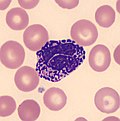Leukocytosis
Definition and distribution[edit | edit source]
Leukocytosis is an increased number of leukocytes in a person's blood. It can be caused by a reactive (secondary) or malignant cause. Depending on the type of leukocyte, we recognize the following types of white line defects, which are also causes of leukocytosis:
- Neutrophilia – an increase in the absolute number of neutrophils in the peripheral blood above the limit of 7.5 × 109/l.
- Lymphocytosis – an increase in the number of lymphocytes in the peripheral blood above the limit of 4.5 × 109/l.
- Basophilia – an increase in the number of basophils in the peripheral blood above the limit of 0.1 × 109/l.
- Monocytosis – an increase in the number of monocytes in the peripheral blood above the limit of 0.8 × 109/l.
- Eosinophils – an increase in the number of eosinophils in the peripheral blood above the limit of 0.25 × 109/l.
Causes of leukocytosis[edit | edit source]
Neutrophilia[edit | edit source]
Neutrophilia can be caused by a number of causes. These causes include:
- infection (bacterial, fungal, spirochete and others),
- inflammation (vasculitis and others),
- physical exertion, pregnancy,
- severe metabolic acidosis (diabetic ketoacidosis),
- smoking
Lymfocytosis[edit | edit source]
Lymphocytosis is usually caused by an acute viral infection or a chronic infection. Other various causes include:
- malignancies (leukemia and lymphomas),
- injuries
- excessive physical exertion
- stress lymphocytosis (after a myocardial infarction or with lymphocytosis after adrenaline).
Bazophilia[edit | edit source]
Most of the causes of basophilia are life-threatening, which is why early diagnosis and then prompt treatment are important. These causes include:
- inflammatory disease (ulcerative colitis and others),
- medications (e.g. estrogens and others),
- irradiation,
- hyperlipidemia
Monocytosis[edit | edit source]
The causes of monocytosis also usually include life-threatening conditions, early diagnosis and then quickly started treatment is important. Such causes include:
- infection (malaria, trypanosomiasis),
- tuberculosis,
- typhoid,
Eozinofilia[edit | edit source]
Eosinophilia can be caused by:
- parasitic disease
- condition after infectious mononucleosis
Diagnose[edit | edit source]
Leukocytosis is detected as part of a differential blood count examination.
Links[edit | edit source]
Related articles[edit | edit source]
External links[edit | edit source]
Bibliography[edit | edit source]
- DZÚRIK, Rastislav. Štandardné terapeutické postupy. 1. edition. Osveta, 1997. ISBN 80-217-0465-9.
- DOBROTOVÁ, Miroslava, et al. Hematológia a transfuziológia : učebnica. 1. edition. Grada ; Bratislava : Grada Slovakia, 2006. ISBN 80-8090-000-0.







